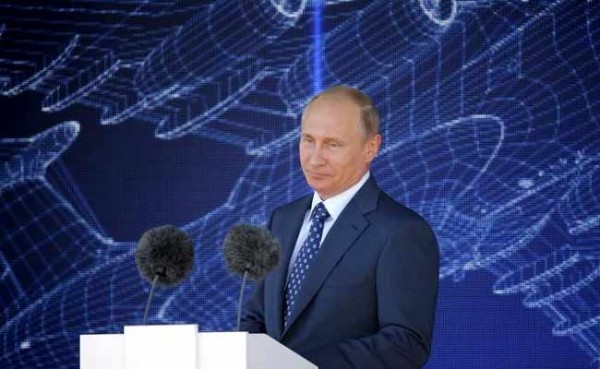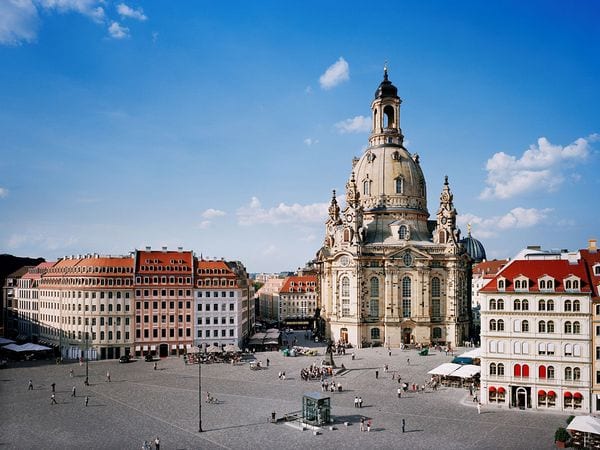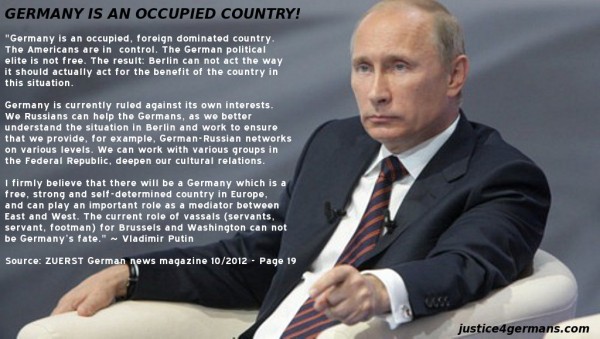Lenin on Tactics of the Democratic Revolution (Lenin 2)
![]() Dispatches
Dispatches
GAITHER STEWART
European Correspondent • Rome
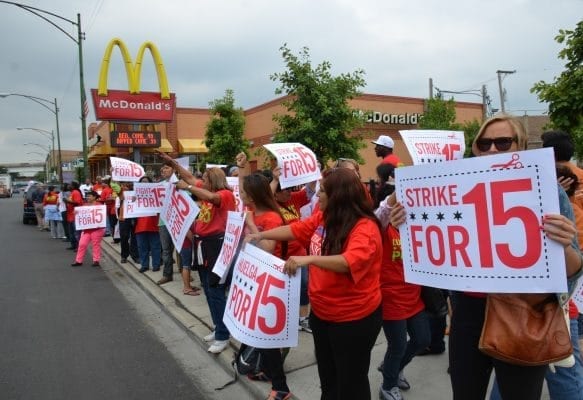
Food workers strike for $15 wage. Steve Rhodes. (CC BY-NC-ND 2.0)
![]() What state of history are we really in? For revolutionists the question is far from academic.
What state of history are we really in? For revolutionists the question is far from academic.
[dropcap]I[/dropcap]n his work “Two Tactics of Social Democracy in the Democratic Revolution”, Lenin discusses a vexing Russian pre-revolutionary problem similar to the problem facing American left radicals today. For Russia of that epoch the question was one of timing and tactics: Was the classical Marxian bourgeois revolution leading to a democratic republic as a first step toward the Socialist Revolution necessary, and even possible, considering the pusillanimous nature of the Russian bourgeoisie at the time? Or could Russia bypass bourgeois capitalism altogether and leap directly from backwardness into advanced socialism? Today, more than a handful of people ask: What will be the nature of the long overdue Great American Revolution?
Since the USA and the West are already in well-advanced capitalism, (albeit within only formally democratic republics—meaning democracies only in form but without substance) the second alternative seems to concern us more today. But is that true? A look at the historical circumstances of Lenin’s era from our historical point of view can be useful in determining where we really stand today.
In the section of his above work dedicated to the bourgeois revolution as “in the highest degree advantageous to the proletariat,” Lenin finds this to be true and in fact “absolutely necessary” in the interests of the proletariat. Today we should keep in mind that the proletariat in the USA is not only the former working class (despite the old-fashioned sound of the word “proletariat” to many, especially to the conservative, neocon imperialistic 0.01 percent), the size of the proletariat has not diminished as it might seem but has grown with the addition of a great part of the former middle class; in fact, around the corner waiting is a whole world consisting of a huge majority of proletarians ruled by a small elite.
Lenin writes that it is more advantageous for the working class if the necessary social changes occur by way of revolution rather that by reform. That simple affirmation gives much room for thought! Reform, Lenin reminds is, is the route of “delay, procrastination and slow decomposition of the putrid parts of the national organism.” Moreover, as we see from day to day, in America as well as across Europe, the proletariat, the working man (1) and the impoverished former middle class—not to mention the poor and neglected one hundred million people of the USA, deprived of adequate health care and education, plagued by obesity and encouraged ignorance, and misled by constant and ubiquitous brainwash and false nationalist propaganda—could only benefit from the Marxist-Leninist, first phase bourgeois revolution before the determinant Great American Socialist Revolution being debated among America’s potential revolutionaries.(Unfortunately, apparently not among the masses of the brainwashed people, about which however I am inclined to think things are not exactly as we think they are.)
In any case, Lenin writes the revolutionary way is the shortcut to a “quick amputation, which is the least painful to the proletariat (which I hope we have agreed exists and is growing rapidly), the way of the direct removal of the decomposing parts, the way of fewest concessions to …(their) disgusting, vile, rotten, and contaminating institutions….” Marxism, Lenin recalls, urges the proletariat not to be aloof to the bourgeois revolution, but to take an energetic part in it and not to allow the bourgeoisie to take command of it.
On the other hand, Lenin advises against fears of a complete victory for social democracy in a democratic revolution and of a revolutionary-democratic dictatorship of the proletariat… for such a victory would arouse the socialist proletariat of Europe… which would in turn help us (the USA likewise today!) to accomplish the socialist revolution.”
In this same article Lenin goes on to discuss the cardinal question of the “possibility of holding power” against the forces of counterrevolution against which maximum unity is necessary among all revolutionary forces. At this point, the path of the revolution lies not from oppression by autocracy in Russia or our 0.01 per cent today, but from a bourgeois republic to socialism.
Lenin hammers home his message that the “social democrat (in those times the future Bolshevik) must never for a moment forget that the proletariat will inevitably have to wage the class struggle for socialism (also) against the most democratic and republican bourgeoisie and petty bourgeoisie. Hence the absolute necessity of a separate, independent, strictly Class Party of Social Democracy (i.e., communism). Hence the temporary nature of out tactics of ‘striking jointly’ with the bourgeoisie and the duty of keeping strict watch ‘over our ally, as over an enemy.’”
Lenin intends that the fight against the autocracy (0.01 percent) is a temporary and transient task of the socialists, the negligence of which would be tantamount to betrayal of socialism and of serving reaction. The bourgeoisie “is inconsistent, self-seeking, and cowardly in its support of the revolution and will turn against the people as soon as its selfish interests are met. There remains the “people”, the proletariat and in those times the peasantry, in our epoch the blue collar workers, service workers, and impoverished middle class, etc., to march to the end, i.e. the socialist revolution.
“The Russian (read also, the American) Revolution will begin to assume its real sweep, will assume the widest revolutionary sweep possible … only when the bourgeoisie recoils from it and when the masses come out as active revolutionaries side by side with the proletariat. In order that our revolution may be carried to its conclusion, (we) must rely on such forces as are capable of paralyzing the inevitable inconsistency of the bourgeoisie, i.e. recoiling from the revolution….
“The proletariat (workers and former middle class) must accomplish the socialist revolution by allying itself to the mass of the semiproletarian elements of the population, in order to crush by force the bourgeoisie….
Lenin on Tactics of the Democratic Revolution (Lenin 2)
Lenin: The Working Class as the Vanguard Fighter for Social Democracy (Lenin 3)
Lenin on Imperialism and Capitalism (Lenin 4)
Flag Graphic: American Socialist Union flag by Ashley. According to the artist:
The Flag of the mighty A.S.U which after the great socialist Revolution of 1912 lead by William Haywood the old bourgeois Regime of the USA was swept aside.
Soon after we strengthened our holdings in the many countries of the Americas until inevitably they all saw the light and joined our glorious union.
This flag represents that union 36 stars one for each country all defending our socialist Ideals against the capitalist hordes threatening our way of life.
![]()
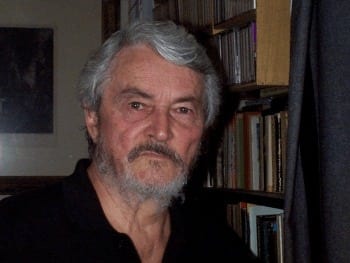 Our Senior Editor based in Rome, serves—inter alia—as our European correspondent. A veteran journalist and essayist on a broad palette of topics from culture to history and politics, he is also the author of the Europe Trilogy, celebrated spy thrillers whose latest volume, Time of Exile, was recently published by Punto Press.
Our Senior Editor based in Rome, serves—inter alia—as our European correspondent. A veteran journalist and essayist on a broad palette of topics from culture to history and politics, he is also the author of the Europe Trilogy, celebrated spy thrillers whose latest volume, Time of Exile, was recently published by Punto Press.
=SUBSCRIBE TODAY! NOTHING TO LOSE, EVERYTHING TO GAIN.=
free • safe • invaluable
[email-subscribers namefield=”YES” desc=”” group=”Public”]
0bama’s Gift to Our Next President: War With China and Russia?
![]() Murray Polner
Murray Polner
Past in Present Tense

US War Games? RT
![]() [dropcap]M[/dropcap]ay I break into our vacuous presidential nomination/election campaigns where candidates hardly ever talk seriously about our history of lying the country into war, as for example the Spanish-American and Philippine wars, WWI, Korea, Vietnam, Iraq, et.al. Lies, mythology and then silence is of course the best way to persuade far too many patriotic if uninformed Americans to regularly send their kids to war.
[dropcap]M[/dropcap]ay I break into our vacuous presidential nomination/election campaigns where candidates hardly ever talk seriously about our history of lying the country into war, as for example the Spanish-American and Philippine wars, WWI, Korea, Vietnam, Iraq, et.al. Lies, mythology and then silence is of course the best way to persuade far too many patriotic if uninformed Americans to regularly send their kids to war.
With Barack Obama allegedly at the helm of foreign policy, the lies are now growing but this time against China and Russia, our latest semi-official enemies. Neither of them are angelic but neither are we. But Obama, as President, is responsible for trying to erect a wall around them, even at the risk of inciting a real war. As his term crawls to its end, the US and China, as the NY Times notes, “are jockeying for dominance in the South Pacific,” which could amount to a time bomb if diplomacy or mutual economic interests fail to intercede. Both are playing Russian Roulette ostensibly, but not really, over essentially barren islets in the South China Sea, the Chinese building an airfield and claiming sovereignty over a few, and the US dispatching warships and planes close to Chinese vessels and planes, both sides risking a catastrophic struggle.
From the time US marines were sent to Australia a few years ago (for what, exactly, has never been explained let alone publicly questioned or debated) to 0bama’s wooing of a hard-line and unrepentant Japanese government eager to discard its American-installed post-WWII pacifist constitution and rearm against China and with new US attachments to India and Vietnam, the 0bama containment policy is clearly aimed at China. In the latest US move the US Navy will participate in joint patrols with the Philippines in the South China Sea and, according to the Associated Press, ” eventually will conduct air patrols.” Then, too, the US will donate some $40 million to the Philippines for military use, for which the US will receive “access to five Philippine military bases to house American forces,” the better, I assume, to fight a war on the Asian mainland at the same time it copes militarily and unsuccessfully with the Greater Middle East.
Word also arrives that a Russian plane flew “‘dangerously close’ to an American ship” as the NY Times inadequately reported. Turns out, as their rival the Washington Post properly reported, that an innocent “American ship” –engaged in the US effort to contain Putin’s Russia– was no cruise ship filled with fun-loving tourists but instead was a destroyer, the USS Donald Cook, which “carries an arsenal that includes rocket launchers, antisubmarine missiles and Tomahawk cruise missiles.” Many US ships and planes have previously and regularly been sent to the Black Sea, all “international waters,” or so the US claimed. Still, 0bama has never been asked –probably because unlike all his 20th Century predecessors he rarely, in fact, very rarely, holds a press conference, — how the US would react if Russian ships suddenly showed up in the Gulf of Mexico or the Caribbean Sea claiming they too were in “international waters.”
There are fewer antiwar skeptics and dissenters left in the mainstream press and TV. Like Randolph Bourne. 0f course you remember his memorable “War is the health of the state?” He was unique. A rarity. Much easier for leaders to lie, reach for guns and bombs, and send sons and daughters not their own to fight their needless wars.
![]()
 Wrote “No Victory Parades: The Return of the Vietnam Veteran“; “When Can I Come Home,” about draft evaders during the Vietnam era; co-authored with Jim O’Grady, “Disarmed and Dangerous,” a dual biography of Dan and Phil Berrigan; and most recently, with Thomas Woods,Jr., ” We Who Dared to Say No to War.” He is the senior book review editor for the History News Network.
Wrote “No Victory Parades: The Return of the Vietnam Veteran“; “When Can I Come Home,” about draft evaders during the Vietnam era; co-authored with Jim O’Grady, “Disarmed and Dangerous,” a dual biography of Dan and Phil Berrigan; and most recently, with Thomas Woods,Jr., ” We Who Dared to Say No to War.” He is the senior book review editor for the History News Network.
=SUBSCRIBE TODAY! NOTHING TO LOSE, EVERYTHING TO GAIN.=
free • safe • invaluable
[email-subscribers namefield=”YES” desc=”” group=”Public”]
Lenin on Compromises (Lenin 1)
![]() Dispatches from
Dispatches from
GAITHER STEWART
European Correspondent • Rome
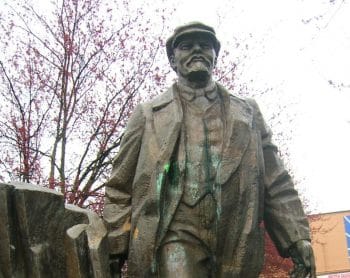
CC BY-SA by andresmh
![]() [dropcap]I[/dropcap]n Lenin’s “Left-wing Communism: An Infantile Disorder”, written in 1920 as a polemic against Dutch and British groups in the new Third International meeting that year in its Second Congress in which strategy and tactics were debated. His target was the West European ultra-left communists who had come out against Marxists working in trade unions or running for public office and sitting in bourgeois parliaments
[dropcap]I[/dropcap]n Lenin’s “Left-wing Communism: An Infantile Disorder”, written in 1920 as a polemic against Dutch and British groups in the new Third International meeting that year in its Second Congress in which strategy and tactics were debated. His target was the West European ultra-left communists who had come out against Marxists working in trade unions or running for public office and sitting in bourgeois parliaments
In his polemic against them Lenin says “it is sad to see people who doubtless consider themselves Marxists forgetting the fundamental truths of Marxism.” As Lenin often did, to make his point he cited the brilliant Engels’ article on the Blanquist Communards who aimed at achieving their aims without any intermediate stations, i.e. without any compromises, which they saw as mere obstacles postponing victory and prolonging the period of slavery to the capitalist class.
Lenin pointed out that the successes of the body of German communists were due to their acceptance of the compromises dictated by historical development while they “constantly pursue the final aim, the abolition of classes and the creation of a society in which there will no longer be private ownership of land or the means of production.” He criticized the Blanquards for wanting to skip intermediate phases and compromises.
“What childish innocence it is to present impatience as a theoretically convincing argument!”
Lenin notes that to young and inexperienced revolutionaries as well as petty-bourgeois revolutionaries it seemed incorrect to “allow compromises”; then he cites British opportunists who reason that “if the Bolsheviks may make a certain compromise, why may we not make any kind of compromises.” From those two positions he shows that there are compromises and there are compromises. “Every proletarian has been through strikes and has experienced compromises when workers had to go back to work either without having achieved anything or agreeing to only partial satisfaction of their demands. The proletarian notices the difference between a compromise enforced by objective conditions such as lack of strike funds and no outside support, extreme hunger and exhaustion which in no way reduces his revolutionary devotion and readiness to continue the struggle and a compromise by traitors like strikebreakers who because of cowardice toady to the capitalists and yield to intimidation, persuasion or flattery.”
In politics however it is a more decision than is differentiating between legitimate compromise in a strike and the traitorous strikebreaker. That, Lenin repeats as he so often does, is the task of party organization and party leaders who through long experience acquire the knowledge and also instinct to resolve political problems, like identifying the mutable dividing line between what is legitimate compromise and what is opportunism. A long process of education, training, enlightenment and everyday experience is required to single out in each separate historical moment the impermissible and opportunistic compromises.
Here, Lenin dwells on the impermissible compromise of opportunism in “defense of the fatherland” when in WWI German socialists backed the predatory interests of its own bourgeoisie in the war, the defense of the bourgeois’s own country also against the revolutionary proletariat and the Soviet movement in Russia. That is, proletarian against proletarian, worker against worker. Lenin saw the defense of bourgeois democracy and parliamentarianism as the chief manifestation of impermissible compromises that he said the “sum total of which constituted the opportunism that is fatal to the revolutionary proletariat and its cause.”
Lenin then condemned certain German Lefts’ rejection of all compromises with other parties. Such views actually condemn the whole of Bolshevism, he points out, which in order to gain power, maneuvered, temporized and compromised with other parties, bourgeois parties included. “To refuse to maneuver, to utilize the conflict of interests among one’s enemies… is this not ridiculous in the extreme?”
After a Socialist revolution of the proletariat in one country, the proletariat of that country is still weaker than the bourgeoisie because of the latter’s international connections and the continuous restoration of capitalism by small commodity producers of the country that has overthrown the bourgeoisie. Compromises with mass allies are necessary.
“Capitalism would not be capitalism if the proletariat were not divided into more developed and less developed strata …, by territorial origin, trade, … religion, and so on. From this follows the absolute necessity for the vanguard of the proletariat, for its class-conscious section, for the Communist Party, to resort to maneuvers, arrangement and compromises with the various groups of proletarians, with the various parties of proletarians … and workers and small masters.
“The whole point,” Lenin concludes, “lies in knowing how to apply these tactics in order to raise the general level of proletarian class consciousness, revolutionary spirit, and ability to fight and win…”
Series:
Lenin on Compromises (Lenin 1)
Lenin on Tactics of the Democratic Revolution (Lenin 2)
Lenin: The Working Class as the Vanguard Fighter for Social Democracy (Lenin 3)
Lenin on Imperialism and Capitalism (Lenin 4)
![]()
 Our Senior Editor based in Rome, serves—inter alia—as our European correspondent. A veteran journalist and essayist on a broad palette of topics from culture to history and politics, he is also the author of the Europe Trilogy, celebrated spy thrillers whose latest volume, Time of Exile, was recently published by Punto Press.
Our Senior Editor based in Rome, serves—inter alia—as our European correspondent. A veteran journalist and essayist on a broad palette of topics from culture to history and politics, he is also the author of the Europe Trilogy, celebrated spy thrillers whose latest volume, Time of Exile, was recently published by Punto Press.
=SUBSCRIBE TODAY! NOTHING TO LOSE, EVERYTHING TO GAIN.=
free • safe • invaluable
[email-subscribers namefield=”YES” desc=”” group=”Public”]
President Vladimir Vladimirovich Putin: The Spy Who Came in Out of the Cold
//
=By=
Gaither Stewart (Rome)
[dropcap]I[/dropcap]n 1973, West German security services learned that Chancellor Willy Brandt’s personal assistant and friend, Günther Guillaume, was a spy for the East German Intelligence Agency, STASI. Despite the gravity of the discovery, the widespread media coverage of the event, the damage to the Chancellor’s image and the raging Cold War between East and West, Brandt remained as Chancellor afterwards—even taking a private vacation with Guillaume after the discovery. Only after Guillaume was arrested on April 24, 1974, did Brandt resign, on May 6, 1974, remaining however as Chairman of the Social Democratic Party until 1987.
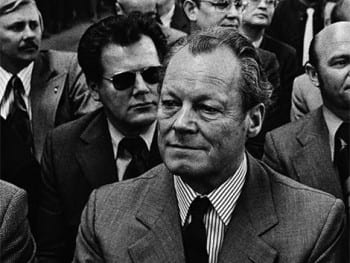
Gunther Guillaume (background, left) Willy Brandt (right), 1974. BSTU. Quelle: BArch, B 145 Bild-00001824
Brandt, at the time dogged by scandal relating to repeated adultery, and struggling with alcohol, seemed to have had enough. As Brandt later said, “I was exhausted, for reasons which had nothing to do with the process going on at the time.” However, after German reunification, STASI-head, Markus Wolf, stated that the resignation of Brandt had never been intended, and that the affair had been one of the biggest mistakes of the East German secret service.
Nonetheless, Guillaume had been a real spy, supervised by Markus Wolf, the head of the Ministry for State Security (Staatssicherheitsdienst) or STASI, considered at the time the world’s best intelligence agency and closely linked to the Soviet Union’s KGB. This middle-Cold War period was still the time of human intelligence, of cloaks and daggers, of defections of Soviet agents and Soviet recruitment of influential Westerners.
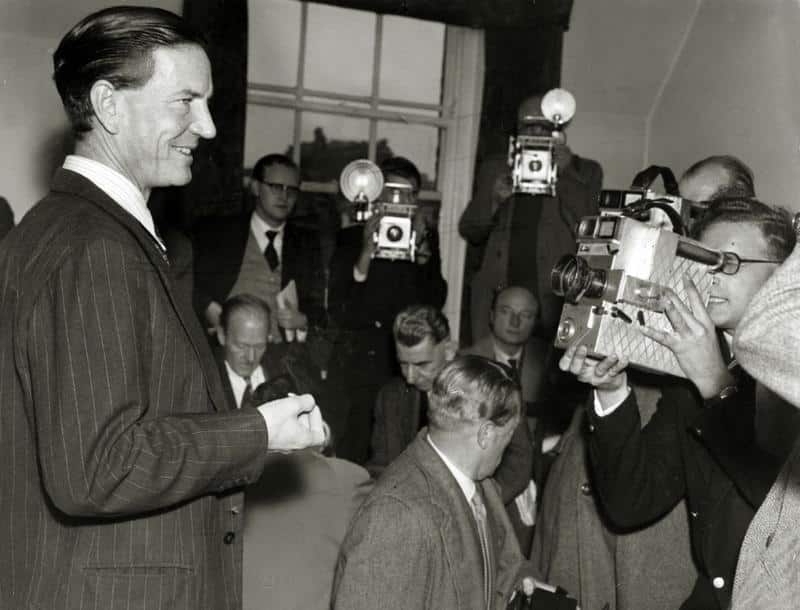
Kim Philby was perhaps the most dashing and elegant of the British spies. With upper class aplomb he defended his actions as product of a higher morality.
Kim Philby, a high-ranking British official in MI6 and member of the Cambridge Five consisting of Donald MacLean, Guy Burgess, Anthony Blunt and probably John Cairncross, worked for many years as a double agent for the British MI6 and the KGB. His affiliation with the KGB was discovered and finally confirmed in Washington by a Soviet defector, KGB Major Anatoly Golitzin. Sometime later, Philby defected to Moscow where he died in 1991. Guillaume was eventually released and sent to East Germany in 1981 in exchange for Western intelligence agents caught by Eastern Bloc nations. Guillaume was celebrated as a hero in East Germany where he worked in the training of spies.
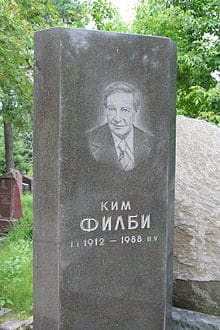
By choice and necessity Philby died and was buried in the Soviet Union. He died there from alcoholism, a common risk for a retired spy and former, largely bored socialite.
Such were the times of human spies, and such events reflected and corresponded to the KGB period of Russia’s current President, Vladimir Putin, who for many people is the most qualified and the most genuine statesman on the world scene today. And such spy times have returned to haunt the nations today. Popular American TV action serials like NCIS deal with spies from most anywhere, newly discovered unexploded nuclear bombs, MOSSAD, KGB; CIA and other intelligence organizations, infiltrators and traitors and assassinations.
The atmosphere calls to mind my own experience as a foreign journalist in Moscow in the 1980s. Moscow-based journalists during the Cold War had fetishes, if not phobias, about KGB surveillance, torn between ignoring their tails or doing something outrageous to irritate them, or behaving well so as not to be expelled for some infraction of the journalist behavior code. Among themselves they liked to exchange “KGB stories”, and warn an envoyé special like me to be careful of this or that. Some even had their own “agent” whom they claimed they got to know.
In fact, in those times the dream of KGB agents like Putin assigned to monitoring foreigners was finding a journalist or best of all an American or West European embassy or consular employee whom they considered recruitable. After which any ruse was permissible to recruit the Westerner as an informer or double agent. Recruitment became an art in those times—and again today. Recruitment was not for every secret agent. The successful recruitment of a foreigner made many KGB careers, as it did the recruitment by the CIA of a Soviet double agent in the USA or West Europe.
After STASI was granted independence from the KGB in 1957, the Soviet Committee For State Security continued until 1990 to maintain liaison officers in all eight main STASI directorates in East Germany, each with his own office inside STASI’s Berlin compound, and in each of the fifteen STASI district headquarters around East Germany. According to East German testimony, KGB officers in East Germany had the same rights and powers that they enjoyed in the Soviet Union. Collaboration between the two agencies was so close that STASI established operational bases in Moscow and Leningrad to monitor visiting East German tourists.
Many important East-West Cold War events and the political changes underway in nervous Eastern Europe occurred during the period of 1985-90 while the young intelligence officer, Vladimir Putin, served in Dresden, East Germany. As he had in Leningrad he was concerned with the recruitment of spies for the KGB in the West. During this period abroad he rose to the KGB rank of Lieutenant Colonel.
As far as Putin’s image as a KGB ogre is concerned, his sixteen-year career in the KGB in the fields of counter-intelligence in Leningrad responsible for monitoring foreigners and foreign intelligence in East Germany was excellent though not unusually momentous. Rank played an important role in his career as it did for all. Soviet intelligence officers had ranks similar to the army. To be sent abroad they had to have been promoted at least twice, to Captain. Average KGB officers tended to reach the grade of Major but often they received a final promotion to Lt. Colonel at the end of their careers. Vladimir Putin received his Lt. Colonel promotion while still active in East Germany—a sign of recognition of his above average qualities. He then finished his KGB career at exactly that rank.
PUTIN IN DRESDEN
It occurred to me in this moment that as young men in the service of our respective governments, Putin and I had several minor things in common. The KGB officer Putin arrived in the big city of Dresden in the mid-1980s for his first posting abroad, some years after I had arrived in West Germany, first in military intelligence then as an employee of the US government. East Germany or the German Democratic Republic (GDR) was created out of the Soviet-occupied zone of post-WWII Germany, as was the German Federal Republic in the West. People on both sides of the Iron Curtain were accustomed to the tense situations in East and West Germany, both of which were packed with spies and military forces, some raring for action. Spies galore. Spies everywhere, and each side trying to recruit more. Both of us as young men had dreamed of performing some act that would change the direction of things, although I soon began dreaming of being in Russia itself. But the reality was that the special life led by most individuals like Putin and myself was humdrum, mostly talking about spies and infiltrators and traitors, a time when the smallest and the most insignificant success could ignite exhilaration and celebration which would not have generated hopes or dreams of a brilliant political career in the man Putin, then in his thirties. He had to perform boring bureaucratic work, earning less than his STASI comrades and with little real human contacts outside the bureaucratic ghetto in which he lived and worked. Then, Putin was obligated to attend endless tedious Soviet-East German social gatherings to celebrate the ties of friendship between the two countries. (Which did not totally lack a genuine feeling of mutuality as there were dedicated communists in the GDR who could rise above narrow nationalistic principles.)
[dropcap]E[/dropcap]ast Germany differed from the USSR in that it had multiple political parties, even though it was firmly under Communist rule. Putin’s German biographer, Boris Reitschuster, writes that this multi-party system became Putin’s political model, although he has always kept in mind the peoples’ power he saw on the streets of Dresden in 1989.
I can imagine Putin in the residential compound reserved for KGB and STASI employees, with limited contact with ordinary German citizens, with a bigger apartment than at home but less real life human contacts. For Putin however this was much better than the Komunalka, the multi-family apartment he had lived in with his parents in his native Leningrad, underlining that living standards were higher in East Germany than in the Soviet Union of that era. Putin brought with him to Dresden his wife Lyudmila, whom he married in 1983, and their small daughter and another on the way. So he had a full family life and could enjoy the city itself by then restored after being leveled in WWII. And he too, as did I not far away in Frankfurt, had to save money in order to buy my first car. And he too loved German beer and developed a paunch that is not apparent today in the bare-chested images of the Russian President.
Such was the life of the “ex-KGB agent” that the Western mainline media uses to describe President Vladimir Putin. (Putin, by the way, pronounced Poo-tin, two syllables, with a clear accent also on the second syllable, and NOT the ugly poot-in in America, with the first syllable accented and the second reduced to en or in.) The German way of life seems to have truly infected the Putin family.
Catching or recruiting spies is unpleasant work, especially for the officer in charge who only sits in some office and gives orders. In most cases you are dealing with traitors of one kind or another. Putin, as did I, will have met persons willing to betray for personal gain. In such cases, the relationship is false: the controller has little respect for the traitor who however is useful, while the traitor wants respect but knows he will never regain it. Kim Philly and his privileged ilk may have broken that mould. His services were recognized and rewarded when he defected to the Soviet Union, but the man and his fellow Oxbridge communists were not so much motivated by crass considerations of money as matters of principle. The British communist cells in the UK’s elite universities of the 1930s, product of a time in which fascism was very much alive, ascendant and in the open, frequently joined the socialist vision out of idealism. Many, like Philby, Burgess, and the rest, being first-hand witnesses of the scars and ugliness of privilege, and living in a society in which the pecking order and the class chasm was firmly and snobbishly enforced, felt the need for a different type of society, not one literally rotting from within.
Such shifts of orientation could imply tremendous personal emotional costs. In most cases you might desire to change your ideological position and even change sides, but it can’t be done without betrayal of your past, former friends or even your former self. Of course, betrayal of a former past that entails an ugly ideology is moral progress. This aspect, however, is too complex to discuss here but the concept enters into the spy life as well as into the relations of the President of a nation with other nations where honesty and trust are significant.
The implosion of the GDR must have been a shock to the Putin family. They had grown to love the city and feared that it would soon cease to exist for them. Putin returned to Dresden in 2006 to visit old haunts. And after he moved from Leningrad then becoming St. Petersburg to Moscow and into a political life, his two daughters, Maria and Katia, were enrolled in the Deutsche Schule. As were mine, I might add…
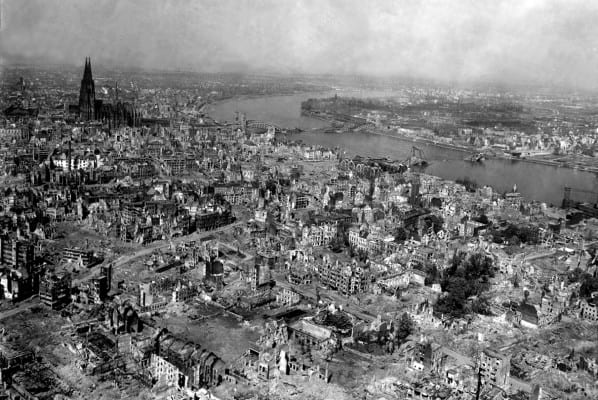
Cologne Cathedral stands undamaged while entire area surrounding it is completely devastated. Railroad station and Hohenzollern Bridge lie damaged to the north and east of the cathedral. Germany, April 24, 1945. T4c. Jack Clemmer. (USArmy)
Today, Putin’s former rank in the KGB, his love for judo and his gunslinger walk are merely grist for the Western anti-Putin propaganda mill. First of all, KGB agents, though feared by the population like most secret services, thought of themselves as the best of the people, something like CIA agents in its early years of the 1950s. Moreover, the CIA maintains such tight relations with its allies worldwide that it tends to take charge when possible, while a swarm of former CIA officers inhabits the corridors of power in the USA and throughout the Empire.
I recall a journalistic interview of years ago with a CIA agent in a European country who told me point blank that “We run this country.” He meant the CIA. And we recall that Bush the Elder, or H.W. Bush, was the CIA Director before becoming President of the USA.
When Putin, rather than support the KGB-sponsored putsch against President Gorbachev in 1991, resigned and became a politician, he said he wanted to be on the right side and was quoted as describing Communism as a blind alley, far away from the mainstream of civilization. (In that, he may have spoken too early, as his course has subtly begun approximating a more socialist than capitalist path, which is after all in consonance with the broader collectivist ethos of the Russian population.)
I have not read Putin’s autobiography, but some of the comments about the book reflect the Western propaganda meme that questions Putin’s very rapid ascendancy to the Presidency. I simply do not see the point as critical. He was there, one among others, on the scene, fighting his way to the top, he was in the right place at the right time. The true traitor was that cruel caricature of a President, the drunk Boris Yeltsin, willing puppet of the west, who let the Soviet Union, and then Russia, be overrun by gangsters, oligarchs and chiefly US capitalists. It was clear that sooner rather than later, a special person was required, not a mere political hack, if Russia was to survive, let alone thrive again as an independent nation. And Putin, of course, had the backing—as would any new president, of the KGB. As Putin himself was quoted: there is no such thing as ex-KGB. And besides, where did Obama come from? He was no real politician, was he? They couldn’t even decide if he was born in the USA. Or even where he was born. And he too had the right backing. The big difference, of course, is the agenda these two men have chosen to serve.
[dropcap]O[/dropcap]ne episode that occurred during the collapse of the GDR in 1989 is told online in a biography of Vladimir Putin. When crowds of enraged Germans stormed the Dresden headquarters of STASI despite police guards who proved helpless, some demonstrators decided to attack the local headquarters of the KGB just across the street. They were met by a man, obviously Putin, who warned them that his comrades inside were armed and ready to use their weapons in an emergency. The group withdrew but the situation remained dangerous. He made phone calls to local military units for protection who told him they couldn’t move without approval from Moscow.
“And Moscow is silent,” Putin was told, words which seemed to change his life. According to Boris Reitschuster, Putin witnessed in Dresden 1989 the problems facing those in power which created in him anxiety about the frailty of political elites and how easily they can be overthrown by the people.
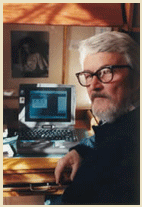 Senior Editor Gaither Stewart, based in Rome, serves—inter alia—as our European correspondent. A veteran journalist and essayist on a broad palette of topics from culture to history and politics, he is also the author of the Europe Trilogy, celebrated spy thrillers whose latest volume, Time of Exile, was recently published by Punto Press.
Senior Editor Gaither Stewart, based in Rome, serves—inter alia—as our European correspondent. A veteran journalist and essayist on a broad palette of topics from culture to history and politics, he is also the author of the Europe Trilogy, celebrated spy thrillers whose latest volume, Time of Exile, was recently published by Punto Press.
Note to Commenters
Due to severe hacking attacks in the recent past that brought our site down for up to 11 days with considerable loss of circulation, we exercise extreme caution in the comments we publish, as the comment box has been one of the main arteries to inject malicious code. Because of that comments may not appear immediately, but rest assured that if you are a legitimate commenter your opinion will be published within 24 hours. If your comment fails to appear, and you wish to reach us directly, send us a mail at: editor@greanvillepost.com
We apologize for this inconvenience.
 Nauseated by the
Nauseated by the
vile corporate media?
Had enough of their lies, escapism,
omissions and relentless manipulation?
Send a donation to
The Greanville Post–or
But be sure to support YOUR media.
If you don’t, who will?
Zhuravko – I too am Ukrainian!
FRONTLINE
NEWS—
Reports, News Flashes, and Commentary from Various Conflict Zones Around the Globe
HUMANITY IN TORMENT
=By= Alexander Chopov
I am Ukrainian – Patriottistische gehandicapte oekraïner, adresseert Nederlanders!
[dropcap]O[/dropcap]leksiy Zhuravko (https://www.facebook.com/avzhuravko) was the ombudsman for the disabled in Ukraine, and helped create thousands of jobs for disabled people. He, a person with one arm and no legs, had to flee Ukraine after he spoke out against Maidan. He is now charged with terrorism and treason.
Yulia Marushevska made millions of dollars since Maidan – at the age of 26, without any prior work experience, she was appointed the head of customs at the Port of Odessa – the most lucrative and corrupt place in one of the most corrupt countries in the world.
One of these people has a pretty face, and has made millions of the suffering that Maidan brought upon Ukraine. The other, had to struggle for everything in his life, yet helped thousands of others, and even though he can’t walk, is a wanted terrorist.
Pick your side when you come to vote on April 6th 2016!
![]() Alexander Chopov, Ph.D. is the Director and Producer of a new YouTube Channel – War in Ukraine – the Unreported Truth. The purpose of the channel is to give the people of Donbass an English voice so they can be heard beyond Donbass. Dr. Chopov has a double major in International Affairs from George Washington University, and a doctorate in political science from the Diplomatic Academy of the Ministry of Foreign Affairs of Russia. He interned in the US Congress, and has lived in US for over 10 years studying both American mentality and politics.
Alexander Chopov, Ph.D. is the Director and Producer of a new YouTube Channel – War in Ukraine – the Unreported Truth. The purpose of the channel is to give the people of Donbass an English voice so they can be heard beyond Donbass. Dr. Chopov has a double major in International Affairs from George Washington University, and a doctorate in political science from the Diplomatic Academy of the Ministry of Foreign Affairs of Russia. He interned in the US Congress, and has lived in US for over 10 years studying both American mentality and politics.
=SUBSCRIBE TODAY! NOTHING TO LOSE, EVERYTHING TO GAIN.=
free • safe • invaluable
[email-subscribers namefield=”YES” desc=”” group=”Public”]

